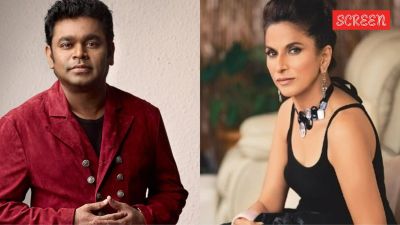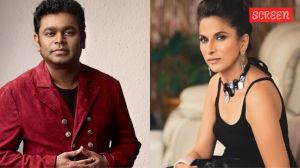Ringmaster
This week a strange spectacle was enacted during the Oscar ceremony on Hollywood Boulevard. A plump, slightly dishevelled man and his entour...

This week a strange spectacle was enacted during the Oscar ceremony on Hollywood Boulevard. A plump, slightly dishevelled man and his entourage kept rushing to the stage to accept golden statuettes, rattle off greetings to folks in New Zealand, and slip in split-second conspiratorial looks. Rumour has it that they were just recovery-boys and girls for a long dead Oxford linguist, once Merton Professor of English and learned preparer of a critical edition of Sir Gawain and the Green Knight.
What delicious contradictions. English-speaking filmdom8217;s richest and most glamorous had congregated for their post-9/11 return to unabashed glitz and bright lights, but the night belonged to a man more comfortable with post-prandial, candle-lit discussions on literature and theology. The gathering hailed a feat of high-tech film-making, of skilful utilisation of computer-generated special effects. But the author of the epic rendered on the big screen was pretty much a confirmed Luddite. In its carefully chosen best/supporting actor/actress awards, the American Academy of Motion Picture Arts and Sciences stuck to its traditional support of good causes. But in the main act, the best film category, it broke with history and for the first time chose a fantasy film.
It happens. J.R.R. Tolkien 1892-1973 does that. The Lord of the Rings begins innocently enough with Mr Bilbo Baggins making plans for his eleventy-first birthday. But then, as Tolkien noted with a wink, the thousand pages that follow seem too few to hold the universe he created. In the course of Baggins8217;s cousin Frodo8217;s efforts to defeat the evil designs of Sauron the Dark Lord, a sprawling mythology unfolds. It is populated with elves and hobbits, evil Orcs and good wizards, dwarves and Men. Frodo8217;s quest to the Crack of Doom takes the reader through a specially crafted topography, enchanted forests and dead marshes, lonely mountains and loudwaters. And this cosmos is made coherently whole with an invented language, a scholarly etymology.
The allure of the trilogy is easy to pinpoint but difficult to explain. It is a good story told with all the attention to detail and pace expected of a master. But why TLOTR8217;s pre-eminence? How is it that five years ago, his fans took to the Internet to exact revenge? Critics had just taken stock of the fading century and decided on its 100 best novels. In no time, readers congregated at web polls and swept the glaring absentee, TLOTR, to the top slot.
Perhaps at a time when storytelling is so splintered, when multiplying media for transmission of information and ideas disallow any one perspective, fantasy is the last realm where a grand narrative sweep is permitted. In Tolkien8217;s time the idea of an omniscient narrator was already under attack. Today, to paraphrase George W. Bush, that past is truly over. Authenticity is the new touchstone. Fantasy is the one genre that allows geographical scale and grand battles between good and evil, free will and destiny.
Decades ago, in a quiet quarter of Oxford Tolkien and his friend and fellow professor, C.S. Lewis, started a group called the Inklings. They used it as a sounding board for their evolving myths and imaginative leaps. From those interactions emerged the two great fantasy serials of all time: TLOTR and the Narnia episodes. They set the foundation for a generation of writers today who are pushing the frontiers of the genre, secularising, democratising and feminising it. For that, he deserves a few more posthumous statuettes.
- 01
- 02
- 03
- 04
- 05































